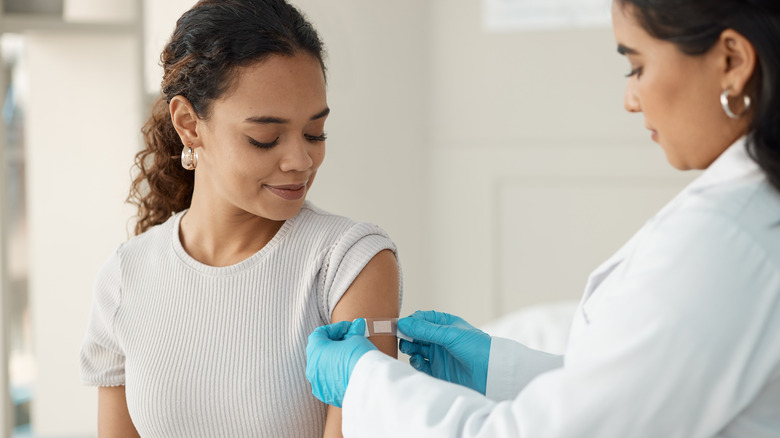The Latest Move By The CDC To Help 'Normalize' The COVID Vaccine
Towards the end of January, the U.S. Food and Drug Administration (FDA) released a briefing document detailing a government proposal to annually modify the makeup of the COVID-19 vaccine to specifically target the year's circulating strains. The argument was that doing so would help streamline the immunization schedule for the general public and potentially increase vaccine uptake.
At the time, some experts voiced their support of the proposal, while others held reservations. Now, the U.S. Centers for Disease Control and Prevention (CDC) has officially added the COVID-19 primary vaccination series and booster shots to their recommended list of annual vaccines. The shot has been added to the recommended immunization schedule for adults, adolescents, and children at least 6 months of age. The decision comes as experts continue to work towards the normalization of COVID-19 vaccination. "This means [the] COVID-19 vaccine is now presented as any other routinely recommended vaccine and is no longer presented in a special "call out" box as in previous years," Dr. Neil Murthy and Dr. A. Patricia Wodi of the CDC told CNN.
CDC issues changes to recommended annual immunizations
Together, the agency's vaccine advisory committee consulted with healthcare professionals including pharmacists, doctors, and nurses in determining their formal recommendation. However, officials emphasize that students are not subject to mandatory vaccination in schools under the new recommendation. Rather, that decision remains in the hands of local or state governments.
However, the addition of the COVID-19 vaccine to the CDC's recommended immunization schedule is not the only change the healthcare community will see this year. As outlined in a public statement, the agency announced that updated recommendations have also been made for the flu shot, pneumococcal conjugate vaccine, as well as measles, mumps, and rubella vaccinations for those 18 or younger.
Since the pandemic and subsequent disease outbreaks, such as cases of the measles that were previously detected in Ohio, experts emphasize the importance of staying vigilant and up to date on one's vaccinations. "We all have a responsibility to ensure everyone can access vaccinations, both for their individual health as well as to prevent the spread of illnesses," Dr. Sean O'Leary, chairman of the American Academy of Pediatrics Committee on Infectious Diseases and CDC vaccine adviser, told CNN.

